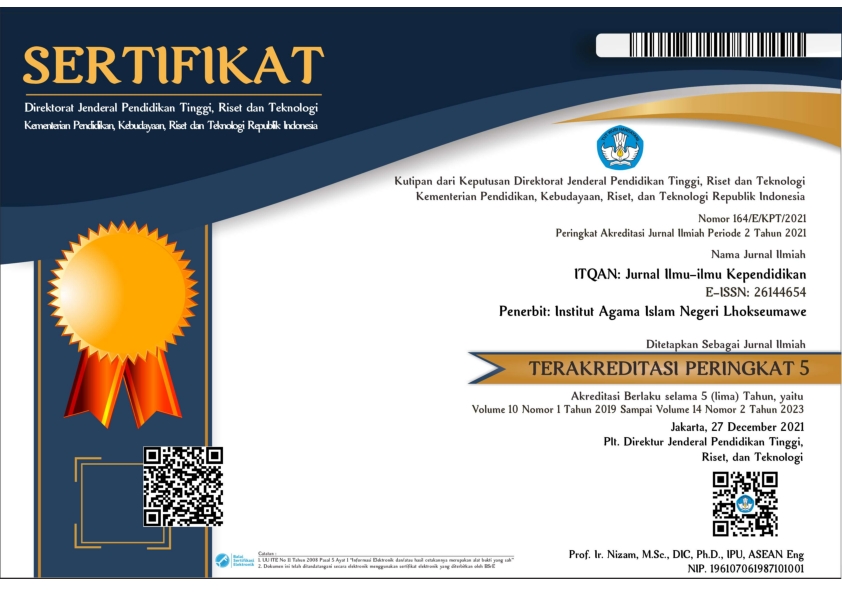Eksistensi Guru Pendidikan Agama Islam dalam Proses Pembelajaran pada Masa Pandemic Covid-19 di Kota Lhokseumawe
Main Article Content
Husaini Husaini
The teaching and learning process that is happening right now really needs more attention from teachers and parents considering the COVID-19 pandemic which requires students to study at home. All of that certainly cannot be separated from the involvement of teachers in Islamic religious education. The objectives of this research are: 1) How is the existence of Islamic religious education teachers in the learning process for students facing the covid 19 pandemic in Lhokseumawe City?. 2) What is the pattern of Islamic Religious Education teachers in providing the learning process during the COVID-19 pandemic in Lhokseumawe City?. The research approach used is qualitative with the type of field study (field research), while the data collection method uses observation, interviews, and documentation. As for the data analysis technique using data reduction, data presentation and drawing conclusions. From the results of this study, it was found that: 1) The existence of Islamic religious education teachers in improving the learning process for students facing the covid 19 pandemic in Lhokseumawe City was not carried out properly, because existing facilities and learning media for Islamic religious education were incomplete, making the learning process only takes place in a few weeks and even then outside of the role of a teacher that should be done, because teachers do not use schedules, syllabus or lesson plans during the covid period, only revolve around sending modules in the form of learning materials and assignments. 2) The pattern of teachers providing an understanding of Islamic religious education learning for children facing the COVID-19 pandemic in Lhokseumawe City is carried out in two ways, namely through direct visits to students' homes and providing an understanding of the learning process during the COVID-19 pandemic for teachers in Lhokseumawe City by using an online pattern (in the network). With this pattern the learning process can be carried out without face to face even though there are obstacles such as the internet network.
Ahmadi, A., & Supriyono, W. (2004). Pisikologi Belajar. PT Rineka Cipta.
Arikunto, S. (2012). Prosedur Penelitian (Suatu Pendekatan Praktis). Asdi Mastya.
Bacharah, S., & (Ed.). (1990). Education Reform: Making Sense of It All. Allyen & Baconle.
Basilaia, G., & Kvavadze, D. (2020). Transition to Online Education in Schools during a SARS-CoV-2 Coronavirus (COVID-19) Pandemic in Georgia. Pedagogical Research, 5(4). https://doi.org/https://doi.org/10.29333/pr/7937
Diknas. (2002). Sistem Pendidikan Tenaga Kependidikan 21 (STPK,21).
Huberman, M., & Saldana. (2014). Qualitative Data Analysis, A Methods Sourcebook. Terjemahan Tjetjep Rohindi Rohidi (3rd ed.). UI-Press.
Jaspers, K. (1971). Philosophy. Volume 2. Terj. E.B. Aston. The Universityof Chicago Press.
Surat Edaran Kemdikbud No 4 Tahun 2020, Tentang Pelaksanaan Pendidikan dalam Masa Darurat Coronavirus Disease (Covid-19), Pub. L. No. 4 (2020).
Mubin, M. N. (2021). Pembelajaran Daring Pendidikan Agama Islam di Masa Pandemi Covid-19 di Sekolah Menengah Sederajat. Heutagogia: Journal of Islamic Education. Juni, 1(1).
Mulyasa. (2005). Menjadi Guru Propesional Menciptakan Pembelajaran Kreatif, dan Menyenangkan. PT Remaja Rosdakarya.
Naim, N. (2011). Menjadi Guru Inspiratif. Pustaka Pelajar.
Nasir, M. (n.d.). Guru PAI Harus Kreatif di Masa Pendemik. https://pendis.kemenag.go.id/pai/berita-197-guru-pai-harus-kreatif-di-masa-pendemik.html
Penyusun, T. (2008). Kamus Bahasa Indonesia. Pusat Bahasa Departemen Pendidikan Nasional.
Prasetyo, M. A. M., Bashori, B., & Lailisna, N. N. (2020). Strategy of boarding school (Pesantren) education in dealing with the COVID-19 pandemic. Khalifa: Journal of Islamic Education, 4(2), 142–160.
Sagala, S. (2010). Konsep dan Makna Pembelajaran. Alfabeta.
Salabi, A. S. (2021). Pengembangan Karier Guru di Pesantren Darul Ihsan Hampran Perak Deli Serdang. Continuous Education, 2(1), 1–16. https://doi.org/https://doi.org/10.51178/ce.v2i1.170
Sudarsana, K., & Dkk. (2020). COVID 19 Perspektif Pendidikan. Yayasan Kita Menulis.
Sugiyono. (2015). Metode Penelitian; Kuantitatif, Kualitatif dan R&D. Alfabeta.
Sukmana, A. P., Iriansyah, H. S., & Erham. (n.d.). Upaya Meningkatkan Pemahaman Peserta Didik pada Materi Dampak Globalisasi melalui Pembelajaran Discovery Learning.
Sutikno, M. S. (2013). Belajar dan Pembelajaran (Upaya Kreatif dalam Mewujudkan Pembelajaran Yang Berhasil).
Suwarna, & Dkk. (2005). Pengajaran Mikro, Pendekatan Praktis dalam Menyiapkan Pendidik Profesional. Tiara Wacana.
Winarno, F. G. (2020). Covid-19 Pelajaran Berharga dari sebuah Pandemi. PT. Gramedia Pustaka Utama.



